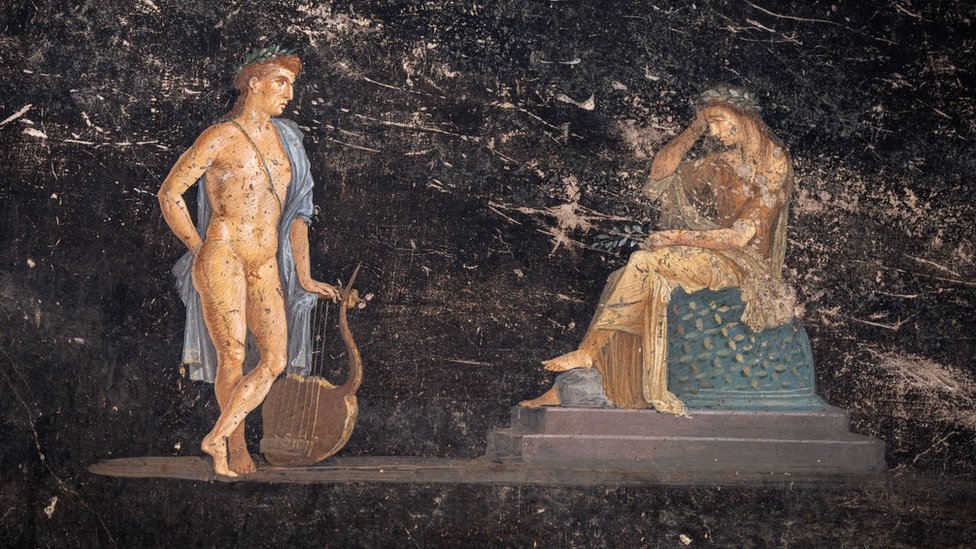Are We Over-Romanticizing the Past?

While many are captivated by the recent discoveries in Pompeii, including a luxurious private bathhouse, it's worth asking: are we too quick to romanticize these ancient finds? Instead of seeing these remnants as a testament to human ingenuity and opulence, perhaps it's time we examine them through a more critical lens. The grandeur of ancient Rome, as depicted by the newly unearthed bathhouse, is not just a story of luxury and sophistication but also one of stark inequality and human suffering.
The media, such as BBC, paints a picture of Roman life that is both fascinating and awe-inspiring. But behind the colorful frescoes and lavish plunge pools, there lies a darker narrative that is often overlooked.
The Glamour Masking Inequality
The discovery of the bathhouse, described as a "once-in-a-century" find, highlights the extreme wealth disparity that existed in ancient Roman society. While the upper echelons enjoyed the luxury of private spas, the majority of the population lived in starkly different conditions. The same archaeological digs that reveal opulence also expose the harsh realities faced by lower-status individuals, such as slaves.
The remains of a young man found near the bathhouse, showing signs of wear and tear on bones at an early age, suggest a life of labor and hardship. This contrast between the lives of the wealthy and the enslaved is reminiscent of the societal divide still prevalent today. It's a poignant reminder that the extravagance of the elite has always come at a cost to the less fortunate.
Lessons from the Furnace Room
While visitors and historians marvel at the engineering marvels of the hot and cold rooms, they often ignore the labor that went into maintaining such luxury. The boiler room, part of the bathhouse complex, was likely a place of extreme heat and grueling work for the slaves who kept the system running. These individuals were essential to the operation of the bathhouse but remain nameless and faceless in historical accounts.
The romanticism surrounding the ruins of Pompeii often glosses over the harsh conditions endured by the slaves. This tendency to focus on the grandeur without acknowledging the suffering is akin to the selective memory that plagues many historical narratives. As we uncover these ancient wonders, we should also strive to give voice to all parts of history, not just the glamorous ones.
A Mirror to Modern Society
The story of Pompeii's latest uncovering is not just about the past; it reflects ongoing issues in our current society. Even today, we see parallels in the division between the wealthy and the working class. The modern equivalent of the Roman bathhouse can be found in the luxury enjoyed by a small percentage of the population, while many still toil in difficult conditions.
Consider the exploitative labor practices in industries that support today's luxuries. For instance, in the fashion industry, workers in countries like Bangladesh often endure hazardous conditions for meager wages to produce clothing sold by upscale brands. It's a stark reminder that behind every luxury, there might be a story of suffering and inequality.
Reframing the Narrative
Instead of focusing solely on the architectural and artistic achievements of ancient Rome, we should use these discoveries as a springboard for deeper reflection on societal issues. The opulence of Pompeii should inspire discussions about historical and modern inequality rather than just admiration for ancient engineering.
By shifting the narrative, we can honor the lives of those who lived in Pompeii and similar societies. We can appreciate the complexity of their world—one that included both breathtaking beauty and profound injustice.
Balancing things out
It's undeniable that the recent discoveries in Pompeii are extraordinary and provide valuable insights into ancient Roman life. However, as we celebrate these finds, we should also challenge the narrative that glorifies the past without acknowledging its darker aspects. The history of Pompeii, like any history, is multifaceted. It is a testament to human achievement and a reminder of the social inequalities that have persisted throughout the ages.
As we continue to unearth the secrets of the past, let's ensure that our fascination is tempered with a critical eye, so that we can learn not just about the marvels of ancient societies but also about the lessons they hold for the present and future.

Keychron V1 QMK Custom Mechanical Keyboard
A versatile 75% layout wireless mechanical keyboard. Perfect for programming with Mac/Windows compatibility and exceptional build quality.


